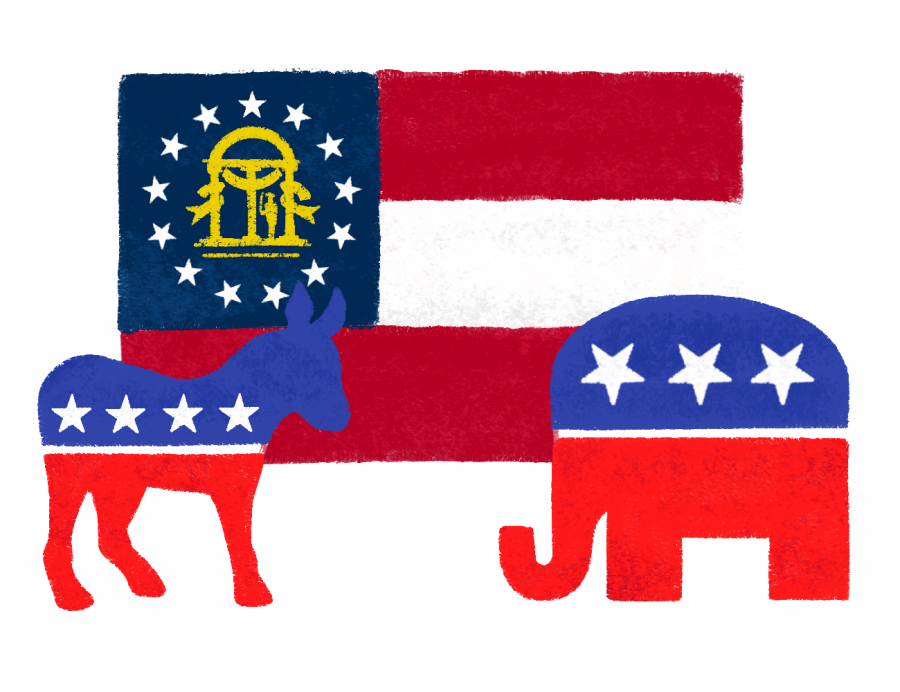Setting the Stage for Political Elections in 2021: Georgia run-offs
January 7, 2021
Georgia’s runoff elections on Jan. 5 will determine whether the Democratic party or the GOP will take control of the Senate, with drastic implications for the Biden Administration.
If Democratic candidates Jon Ossoff and Raphael Warnock both win Senate seats in January, the Senate will flip to a Democratic majority with Vice President-elect Kamala Harris authorized to break ties, making it the first time in 11 years that Democrats control the Legislative and Executive Branches.
“A Democratic majority in the U.S. Senate would be the biggest difference maker to help Biden deliver across the country,” Senate minority leader Chuck Schumer said.
If either Republican candidates David Perdue or Kelly Loeffler hang on to their positions, the Republican-controlled Senate can limit Biden’s agenda and restrict his attempts to pass major legislation concerning the pandemic, abortion and other issues.
Run-off elections occur when no candidate receives the majority of votes needed to win the election, and acts as a rematch for the top two candidates to declare a seat winner. Incumbent Republican senator Perdue faces Democrat Ossoff in the first runoff race.
Perdue’s avocation for stock trading has stoked controversy, with ethical questions arising over his stock purchases. Earlier this year, Perdue faced heavy scrutiny for buying stock in Dupont de Nemours, a company that manufactures PPE, after a Senate briefing on the coronavirus held on the same day. In 2018, Perdue made timely and profitable share purchases in a Navy contractor just before becoming the head of a Senate subcommittee supervising the Navy fleet.
Ossoff, an investigative journalist, previously ran for Georgia’s Sixth Congressional District in 2017 but lost in the runoff election against Republican Karen Handel. This year, he runs with a progressive standpoint on healthcare and women’s issues, and hopes to support policies that entail affordable healthcare and debt-free public college.
“Our ability to respond to this pandemic and to invest in economic recovery and get financial relief to people depends on victory here,” Ossoff said.
The other race has incumbent Loeffler facing off against Warnock in a special election, where the elected senator will complete the remaining two years from the six-year term Johnny Isakson was appointed to in 2016.
Loeffler was appointed to the position in 2019 by Governor Brian Kemp after Isakson resigned due to health concerns. Like Perdue, Loeffler was put under fire for engaging in stock trading activities amidst the pandemic.
Warnock is the senior pastor of Ebenezer Baptist Church in Atlanta, and was drawn into politics through his activism supporting the expansion of Medicaid in the state.
In preparation for January, organizations across the state have been rallying eligible voters to participate in the runoffs, focusing on the 23,000 teens who will turn 18 before the runoffs. When We All Vote, a nonpartisan organization that works with high schools to increase voter turnout, utilizes social media and games like “Among Us” to share voting and registration details.
“I think this is important to equip the next generation with the most important tool, which is their vote,” student activist Tiffany Pham from Clayton County, Ga. said. “Historically, we’ve always been seen as the apathetic generation. That’s simply not true.”



![AAAAAND ANOTHER THING: [CENSORED] [REDACTED] [BABY SCREAMING] [SIRENS] [SILENCE].](https://thehowleronline.org/wp-content/uploads/2025/06/lucy-1200x800.jpg)






















































![AAAAAND ANOTHER THING: [CENSORED] [REDACTED] [BABY SCREAMING] [SIRENS] [SILENCE].](https://thehowleronline.org/wp-content/uploads/2025/06/lucy-300x200.jpg)